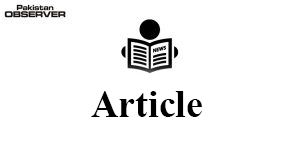Qamar Rafiq
THE landscape of the entire business world in the 21st Century is curiously diverse, competitive and baffling which means leaders have extraordinary responsibilities to translate corporate vision into the reality in the crisis of financial calamity, pandemic outbreak, shambolic racial inequalities and regional security threats. Perhaps, the multifarious socio-political environment and humanitarian crisis around the world provides a wide-open playfield for leaders to display their abilities to reshape the future of their organisations and societies by mentoring their teams how to fish instead of giving one. There is no doubt that leadership is a Bible of every success and every single person in a team matters which may yield incredible wonders. To my mind, the success of leaders in the 21st Century will profoundly spin around 3D’s: diplomacy, development and dedication. Disruptive business models, invasion of digitization and machine learning, cross-cultural turbulence and augmented workforce have challenged leaders to man up to show a way forward. For this purpose, leaders are expected to architect and formulate the robust strategies of diplomacy, development and dedication to drive people to reach great heights of performance.
Consequently, both political and business organisations are hunting down the leaders who have an aptitude to inspire others to dream more, learn more, do more and achieve more. The strategic responsibility of leaders is not only to act as a “Role Model” to promote collaborative teamwork and innovative ideas but also to manage the undiscovered vistas of diversity, cohesion and inclusiveness to harbour extravagant gifts. Evolving leadership models in present time, will broadly style to cover the topics of emotional intelligence, freedom of religion or belief (FoRB), equality and diversity and existential crisis arising from climate changes which were never part of the old-fashioned leadership manifesto. So, the importance of transformational leadership philosophy and emotional intelligence toolkit cannot be sidelined which relentlessly emphasises on establishing new benchmarks and cultural trends to formulate corporate strategies for needed change. We don’t need heroes and super intelligent brains, we need a piece of guidance. Uncertain times are here, which have raised the importance of emotional intelligence which can aid organisations to transform people’s beliefs and values into actions. The study of individual behaviour and active listening are key factors to motivate and inspire people. Following this, the leaders must step into the shoes of their subordinates for active listening to navigate their talents and challenges with an empathetic approach, particularly in compelling situations. Meanwhile, in the limbo of achieving extraordinary from the ordinary people, leaders will not only be required to introduce attractive reward systems but also to offer psychological support from fractured family relationships, to stress disorders, beyond organisational boundaries. The primary focus of modern organizations is on the growth and wellbeing of their employees which wasn’t the case before.
In a world which is confused by opinions, divisions and chaos, the true mark of a leader is a willingness to trust and delegate responsibilities, whereas poor leadership often underestimates the talent and potential of their employees and never uses their brain. The current global situation is an opportunity for leaders to make a difference. The world calls on leaders: “raise your message, not your voice.” Therefore, amongst other responsibilities, leaders will also focus on nourishing an environment where innovative ideas are respected not scraped. Leaders must be deeply connected to their mission – as a role model, they must influence people to involve in planning and decision making in order to learn and grow together. Above all leaders have to put both head and heart that creates the impact and change we all craving to see. Similarly, the values of praise, compliment and acknowledgement will be key areas of concern for organisations which are a powerful tool for transformation, healing, and change.
Coping with rapid shifts in the business world – as a ray of hope, implantation of servant leadership characteristics in the organisational ethos will be paramount to experience a new kind of power: a power that infects and benefits all. Above all, the most crucial role of the leaders will be to act like a fairy tale figure in the business and political world to provide spaces to their teams to have their say and to engender opportunities of cohesion in a divided business and political quarters. Nevertheless, the degree of success will be contingent on a leader’s own success to innovate and foster a shared learning culture on the principles of where everyone matters. According to Deloitte research about leadership in the 21st Century, traditional leadership theories will have a very much place in the present time, but they should be combined with other modern techniques and tools of leadership. The rapid changes in the business world demand organisation to sense lead and extend their capabilities to meet their financial objectives. The constant influx of new technological innovations means that organisations need to be able to operate and lead in an environment of continuous innovation and improvement. Steve Jobs truly said, “An organization should be run by ideas and not hierarchy”. The true quality of a leader is to identify talents and place them in deserving roles. In the 21st Century, leaders will have the power of knowing, they will not only use their brain but also heart to implant their mission with candour, transparency and credit. Live your mission, the world today in 2020 will take note.
—The writer is based in the UK, has an MBA from Pakistan, Studied leadership in 21st Century from Copenhagen Business School and has specialization in Health informatics from Johns Hopkins University.










